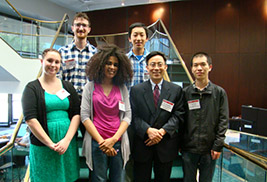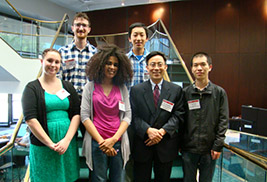Featured Article
Kent State Team Awarded for Fuel Cell Research
Two Kent State students and a post-doctoral research associate in the College of Applied Engineering, Sustainability and Technology have been awarded top prizes at the 2015 Ohio Fuel Cell Symposium for their research on fuel cells, which are devices that convert chemical energy into electricity.
read moreKent State Team Awarded for Fuel Cell Research
Posted Aug. 10, 2015 | Haley Keding
Pictured is the Kent State University research group at the
annual Ohio Fuel Cell Symposium. In the front row, from left
to right, are Rachel Kaminski, Aliaa Maar, Yanhai Du, Ph.D.,
and Kai Zhao, Ph.D. In the back row are Theo Woodson
and high school student Kevin Du.
(Photo credit: Rachel DeYoung)
Two Kent State University students and a postdoctoral research associate in the College of Applied Engineering, Sustainability and Technology have been awarded first-, second- and third-place prizes at the 2015 Ohio Fuel Cell Symposium for their research on fuel cells, which are devices that convert chemical energy into electricity.
The symposium took place June 15-16 in Elyria, Ohio, where participants attended lectures, tours and presentations on fuel cells. The three competed in the Student Design Competition and were awarded monetary prizes for their presentations.
Graduate technology major Aliaa Maar won first place and received $300, postdoctoral research associate Kai Zhao placed second and received $200, and senior technology major Theo Woodson won third place and received $100. Yanhai Du, Ph.D., assistant professor at Kent State’s College of Applied Engineering, Sustainability and Technology, accompanied the students and was awarded $1,000 for the university to use toward the Ohio Fuel Cell Coalition membership dues.
“I wanted my students to go there to learn more about fuel cells and to show what we are doing at Kent State,” Du says. “I didn’t really expect them to win any prizes.”
Maar says her success at the symposium gave her more confidence to engage in conversations with her colleagues and attributes that success to the time she spends in the lab with Du.
“Working with Dr. Du is one of the best things that could have happened to me,” Maar says. “I have been introduced to fuel cells and additive manufacturing, which are two technologies that speak the language of the future. I am very lucky to work under his direct supervision. I’ve learned a lot academically and personally.”
Du also mentored senior aeronautics major Miguel R.D. Richey this past spring as they prepared for a presentation at the 2015 Undergraduate Research Symposium. At the symposium, Richey presented his research on fuel cells to discover a potential, future source of clean energy for the aerospace industry.
“My experience working with Dr. Du was very helpful,” Richey says. “He provided me with a lot of information about fuel cells. This experience has given me a wider scope on alternative aircraft propulsion.”
After being awarded the 2014 Ohio Space Grant Consortium scholarship, Richey went on to present his research at the state level.
Du says he enjoys taking his students to conventions because he wants to give them opportunities to grow in their field of study. This past spring, he took his fuel cell classes to the Ceramics Expo in Cleveland and encouraged his Introduction to Sustainability class to attend the GreenTown conference in Kent.
“My whole philosophy as a teacher is to look for the best way to benefit the students,” Du says. “If there is an opportunity for them to learn outside the classroom, then I encourage them to go.”
Du’s Research Applications
Du joined Kent State in 2013 and focuses his research on sources of clean energy. He specifically looks at fuel cells, which are a form of clean energy, and how to use them as portable power for devices like phone chargers and car engines.
“You can use a fuel cell as a power station or it can be portable,” Du says. “Right now, if you want to be portable, you have to use a battery, which has a limited lifetime. Fuel cells have a continuous supply of power.”
Fuel cells also are extremely efficient and will reduce our carbon footprint, which Du says is another reason to use them rather than traditional energy sources. The United States currently uses fossil fuels to produce 80 percent of its electricity.
To learn more about Du and his research, visit www.kent.edu/caest/profile/yanhai-du-phd.
For more information about Kent State’s College of Applied Engineering, Sustainability and Technology, visit www.kent.edu/caest.
